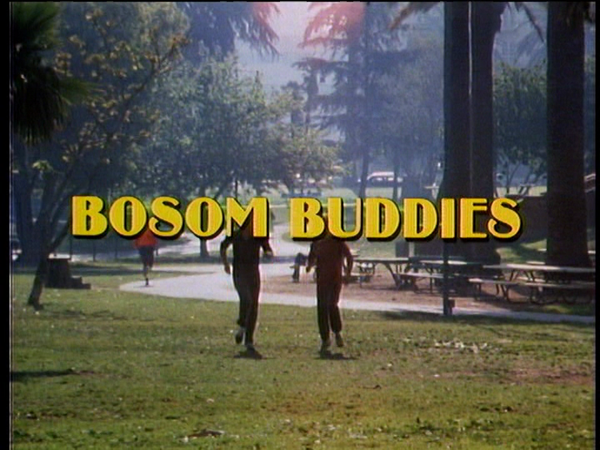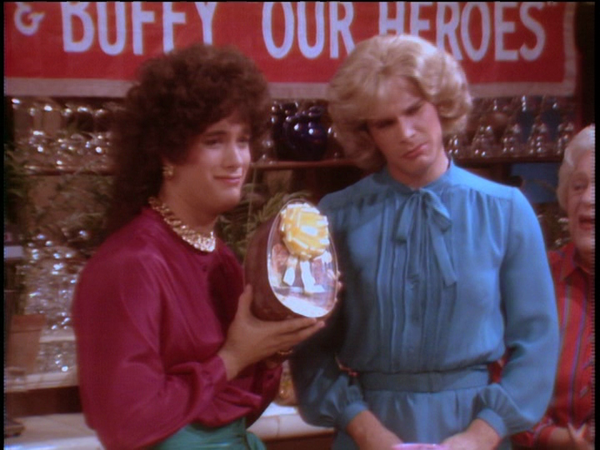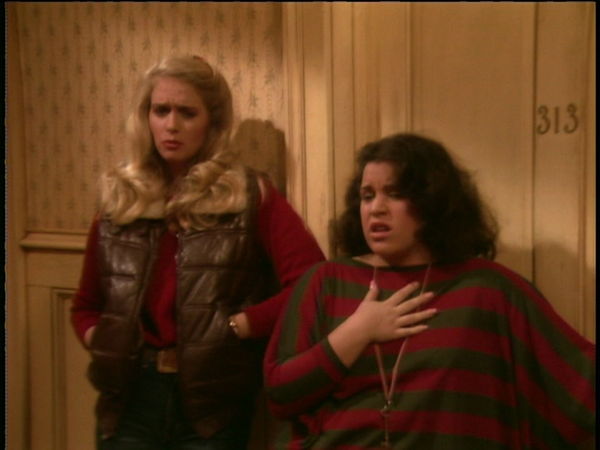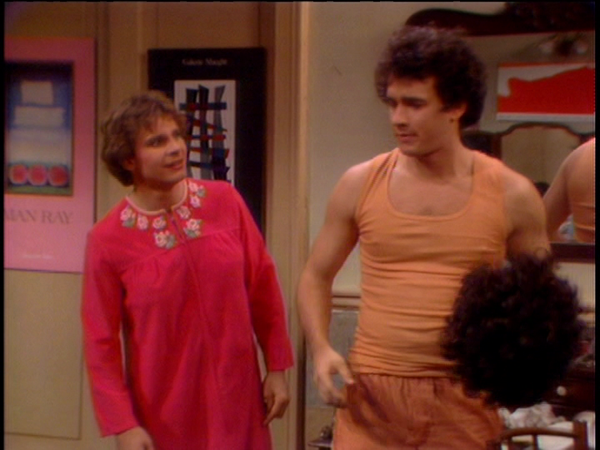| Reviews & Columns |
|
Reviews DVD TV on DVD Blu-ray 4K UHD International DVDs In Theaters Reviews by Studio Video Games Features Collector Series DVDs Easter Egg Database Interviews DVD Talk Radio Feature Articles Columns Anime Talk DVD Savant Horror DVDs The M.O.D. Squad Art House HD Talk Silent DVD
|
DVD Talk Forum |
|
|
| Resources |
|
DVD Price Search Customer Service #'s RCE Info Links |
|
Columns
|
|
|
Bosom Buddies: The Complete Series
Guys in dresses get cheap rent and learn about women

Reviewer's Bias*
Loves: Wendie Jo Sperber, sitcoms
Likes: Tom Hanks
Dislikes: How old favorites tend to age
Hates: Missing the original theme song
The Show
Before watching these discs, it had been decades since seeing an episode of Bosom Buddies, and there was a sense of trepidation considering how the world has changed in that time. An early 1980s show about a couple of guys who pretend to be women has a real likelihood of having aged quite badly over the years (as 2012's quickly-cancelled drag sitcom Work It proved so readily.) Could a show about a pair of dudes who dress like women, made in an era before LGBTQ was even a term, possibly draw laughs without being seen as outdated at best and offensive at worst?
Surprisingly, the answer is yes. Not once in 37 episodes of the show was homosexuality used as a punchline, nor were transgender identities (the idea of being transgender was not exactly a mainstream topic--Renée Richards aside--and wasn't likely to be mentioned either way.) If anything, the concept of men in dresses--Kip (Tom Hanks) and Henry (Peter Scolari) take on the identities of Buffy and Hildy to move into a cheap apartment in a building for women only--is used as a way for the guys to learn more about how women are treated first-hand. Sure, there are your expected gags about the uncomfortable nature of women's clothing, the guys questioning their masculinity and unwelcome advances from other fellows, but for the most part the drag is a plot device (especially in the second season, where the idea is nearly discarded.)

Obviously, the show is about Kip and Henry (and Buffy and Hildy) and thus the stars are the engine. With Hanks, we know what we have, and the charm and humor he's made into his own personal brand was obvious from the start, even if now the part is against type as he plays something of a womanizer. The wilder of the duo, he tends to get the better jokes and the more outlandish behavior, but he's still the Hanks we know and love. The unknown factor for many is Scolari, who didn't have the same rarefied career trajectory of his co-star, though he has worked non-stop for nearly four decades--in live-action and animation. A funny actor in his own right--with a somewhat surprisingly muscular physique--Scolari was given plenty of opportunities to showcase his talents in Bosom Buddies, particularly his skilled impersonations, like his fine Peter Falk or Rod Serling, which are displayed on a number of occasions. Together, Hanks and Scolari are a solid duo, with good chemistry.
For a show focused on two guys, the series had a remarkable female cast as well, and they are given just as much chance to shine as the guys, starting with Sonny, the object of Kip's affection, played by Donna Dixon. The reason she's in the role is obvious--she's the stunning blonde that was required by TV law in the ‘80s--but she's quite funny as well, allowing her to trade comedic punches with her co-stars, including Wendie Jo Sperber as Amy, who is stuck in a unrequited obsession for Henry. An underrated comedic gem who was so memorable in films like Bachelor Party and Stewardess School, Sperber is a blast in this show, bringing energy and humor every time she's on-screen (with the exceptions of when we are supposed to feel bad for her, as life isn't quite fair for the non-traditional beauty in the bunch.)
Telma Hopkins, like Scolari, never seemed to struggle for work, and this series clearly showed why, as she got to display all her skills, as the crew's one black friend, the eventual manager of the building and a singing sensation. Hopkins also served to ground the show a bit, bringing her fantastical friends down to earth a bit, while also getting some fun one-liners in as the show's resident sassy best friend. Of course, one cannot forget the brilliance of Holland Taylor, who plays the boys' boss Ruth, and the only actual adult in the main cast (the rest are just a year or two removed from college, though since it's the ‘80s, they seem like they are in their mid-30s for some reason.) Taylor gets to play perhaps the most complex character, a woman who knows what she wants and won't let anything stop her from getting it, whether it's in her personal or business life, however her focus on career and sex has left her lonely. That said, she has a sarcastic wit and a gift for physical comedy that the show puts to good use. A scene involving her and a bean-bag chair might be the funniest thing in the entire series.
The show--at least in the early going--offers up a mix of stories about the guys trying to get by as women and not let their cover slip, while ingratiating themselves with their new neighbors. Only Amy, their co-worker, knows the truth, as she acts as a co-conspirator, glad to have Henry live across the hall. The show milks as much as it can from the hidden-identity conceit before eventually pushing it into the background, allowing the main cast in on the ruse, though it does occasionally crop up, like when Kip and Henry's parents find out (in two separate episodes.) It's mostly a workplace, buddy comedy, about two pals with different personalities, with the second season focusing on their attempts to building their own advertising business. That the show changed so dramatically from the first season to the second--changing jobs and relegating the drag element--was a warning sign that the show wasn't long for this life, and it ended after two seasons.
Though there's not a lot in the core of the series that separates this show from other sitcoms of the era (aside from Hanks and some dresses), it does feel unique in how it tried to do things a bit different. Many episodes would push the comedy to the side and attempt a more serious tone, as the characters suffered setbacks. Of course, in the ‘80s the "very special episode" became a sitcom trope, but this was something different. This was an integration of comedy and pathos and though awkward, it was certainly striking. It was one of several elements that felt like the show could experiment, playing with voiceover, flashbacks and flash-forwards, and fantasy sequences. Sure, it relied far too often on bad puns, and Henry was frequently unlikable as he often treated the sexy, funny and loving Amy, like dirt, but the show is quite watchable, especially if you're tuning in for the ladies.
Note: Disappointingly, but expectedly, the discs feature the syndicated theme song, "Shake Me Loose" by Stephanie Mills, rather than Billy Joel's great "My Life" (even if it wasn't actually sung by the Piano Man.) It's a bummer, especially when you have to hear "Shake Me Loose" 74 times (in the opening titles and closing credits). Mr. Joel's tune would have been much more bearable.

The Discs
The 37 episodes of Bosom Buddies are spread over six DVDs, which are packed in a clear, dual-hubbed, standard-width keepcase with two double-sided trays, while the two-sided cover has an episode listing on the inside. The static, anamorphic-widescreen menus have options to play all the episodes, select shows and check out the extras (if applicable.) There are no audio options and no subtitles.
The Quality
These are the same episodes released over 10 years ago now (heck, considering the disc art says 2007, maybe they are actually the original discs) and they are still the solid presentations they were then, certainly looking nearly 40 years old, but not looking bad, outside of the softness and garish colors that video of the time provided. The first episode, shot on film, looks a little better, and there are some minor stray video defects here and there, but otherwise these full-frame episodes look good, with OK detail and no noted added problems.
Delivered in Dolby Digital mono, this track isn't giving you anything besides what you would have heard at the time the show aired: flat, simple audio, though you will notice a few changes to the music if you're someone with a remarkable memory of music cues from 1980-1982 (or a solid home-made VHS collection.)
The Extras
Just one extra to check out here, as a sales presentation aimed at syndication is on the final disc. The 6:50 highlight reel includes plenty of narration pitching the show's value and flexibility for any channel or line-up. It's sort of goofy now, but it's neat to get an inside peek at how the business once was.

The Bottom Line
Without the cast on hand, Bosom Buddies would have been a footnote in TV history, rather than the footnote it is in Tom Hanks' career. Even so, it's not the worst show to binge away on, as there are a decent number of laughs to be found, particularly from the very funny female side of the roster. Presentation-wise, this is the same stuff that came out a decade ago, just cheaper and in a more convenient box. Worth checking out for the loyal and the curious.
Francis Rizzo III is a native Long Islander, where he works in academia. In his spare time, he enjoys watching hockey, writing and spending time with his wife, daughter and puppy.Follow him on Twitter
*The Reviewer's Bias section is an attempt to help readers use the review to its best effect. By knowing where the reviewer's biases lie on the film's subject matter, one can read the review with the right mindset.
|
| Popular Reviews |
| Sponsored Links |
|
|
| Sponsored Links |
|
|
| Release List | Reviews | Shop | Newsletter | Forum | DVD Giveaways | Blu-Ray | Advertise |
|
Copyright 2024 DVDTalk.com All Rights Reserved. Legal Info, Privacy Policy, Terms of Use,
Manage Preferences,
Your Privacy Choices | |||||||














